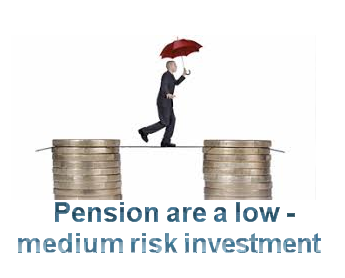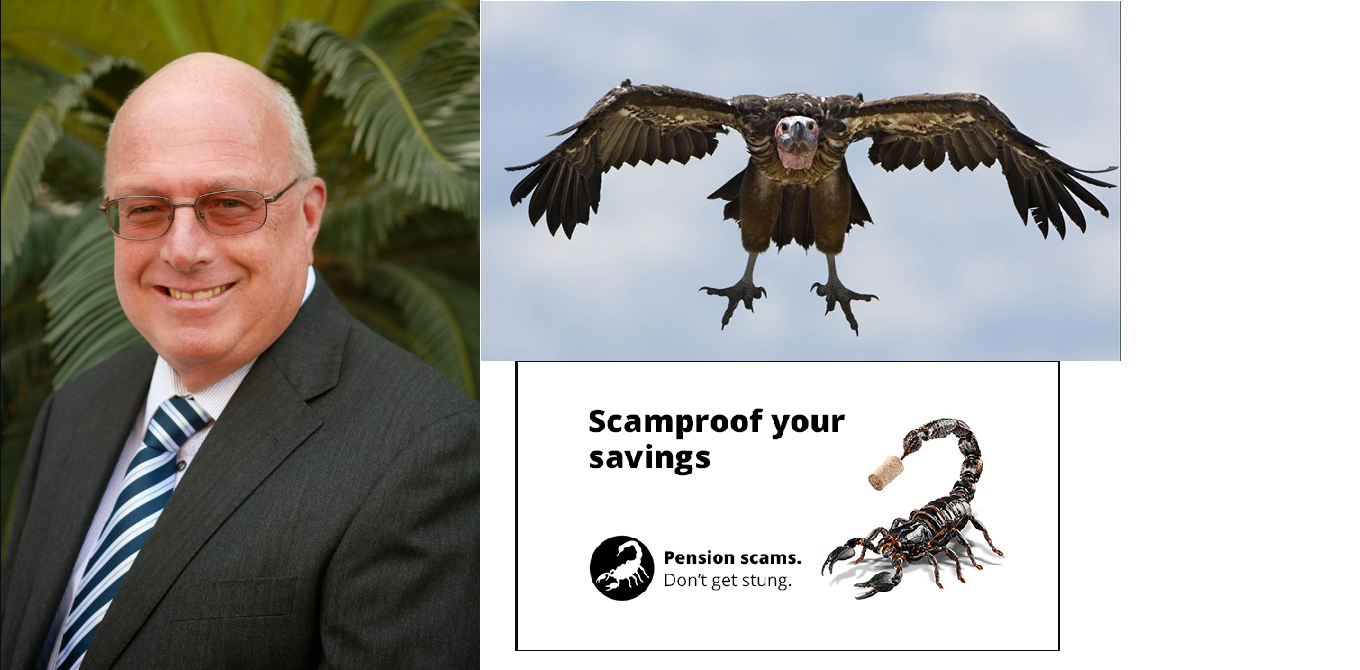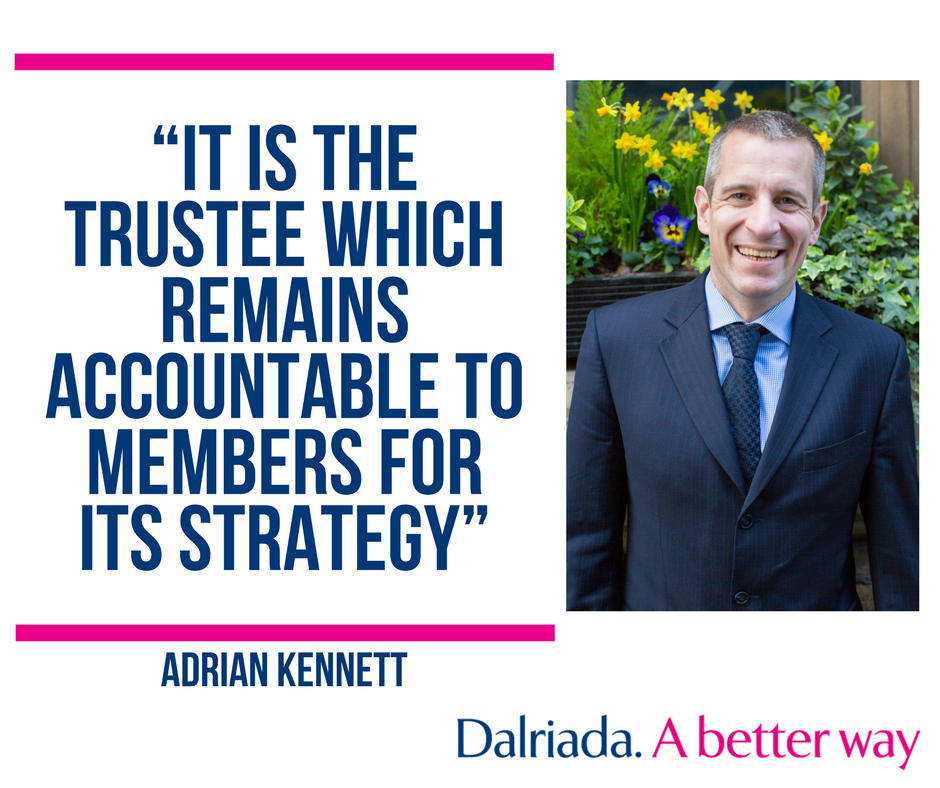 Scammers who act as financial advisers and operate pension scams, don’t wear a badge to identify themselves – nor do they pay any redress for the devastation they cause. Oh no, of course they don’t! The scammers dress in snazzy suits, drive go-faster cars, sport posh briefcases and speak with a silky sales tune floating out of their mouths. All this lulls victims into a false sense of security. Promises of guaranteed high returns and capital protection, as well as tax efficiency – and then… POOF! – there goes your whole life savings.
Scammers who act as financial advisers and operate pension scams, don’t wear a badge to identify themselves – nor do they pay any redress for the devastation they cause. Oh no, of course they don’t! The scammers dress in snazzy suits, drive go-faster cars, sport posh briefcases and speak with a silky sales tune floating out of their mouths. All this lulls victims into a false sense of security. Promises of guaranteed high returns and capital protection, as well as tax efficiency – and then… POOF! – there goes your whole life savings.
This poem was passed over to us by a twitter friend. We think it wonderfully sums up the way scammers work:
 Poem
Poem
Above the calming waves, you spot a dorsal fin,
Is it that greedy shark who’s gonna take you in?
So you dip your toes to test and out pops friendly Flipper,
He’s so adorable but…
did you know his snout can also be a killer?
You listen to his clicking sounds that dull out your senses,
You write those cheques then wish you hadn’t been so careless,
As you wave goodbye to Flipper, you feel like all those lemmings,
The wistful trail of your pension and POOF!
there goes your whole life savings.
Don’t fall for the silky-voiced salesman´s tune. Follow the guidance in our ten standards to safeguard your pension from the scammers.
Ten standards for a financial adviser
1 – The firm that a trustworthy financial adviser works for will have the correct licences to advise you on your pension. It will be fully licensed (regulated) for both insurance and investment, and the adviser will not hesitate to give you proof of this.
2 – A trustworthy financial adviser will be fully qualified to the correct level and be happy to show you their certificates. A certified adviser will work to a correct code (not a scammer’s code) and never use silky sales techniques to get you to sign over your life savings.
3 – A trustworthy firm and their fully qualified advisers will have all the correct paperwork and this includes professional indemnity insurance.
 4 – A financial adviser who wants to help your pension grow steadily – with safe and suitable investments – will never throw sky-high promises of super fat returns at you. Scammers love this too-good-to-be-true sales technique. Remember, if it sounds too good to be true it probably is! And it is a sign that they are working for commission benefits that will line their pockets and probably not suit your risk profile. A pension risk profile is usually a low-medium risk which will grow steadily. High commission investments are often high risk and also often fail – causing devastating losses.
4 – A financial adviser who wants to help your pension grow steadily – with safe and suitable investments – will never throw sky-high promises of super fat returns at you. Scammers love this too-good-to-be-true sales technique. Remember, if it sounds too good to be true it probably is! And it is a sign that they are working for commission benefits that will line their pockets and probably not suit your risk profile. A pension risk profile is usually a low-medium risk which will grow steadily. High commission investments are often high risk and also often fail – causing devastating losses.
5 – A financial adviser that works for your benefit and that alone will never expose you to a hard sales pitch. Repeat phone calls and pressure to sign – “for fear of missing out” – are often a tell-tale sign they are working for commission. Scam advisers – working for fat commissions at the expense of customer satisfaction – will rarely respect your risk profile. They will rarely observe any compliance ethics either.
6 – A financial adviser that you can trust should NEVER up-sell you with ‘extra’ investments like insurance bonds. Often these are a double wrapper that will make a scammer extra commissions. These ‘extra’ investments will often simply drain your pension pot, not contribute to it.
 7 – If your adviser tries to sell you structured notes, UCIS funds, unsecured loan notes, in-house funds, non-standard assets or any ongoing commission-paying investments, he is probably not a trustworthy adviser. Scammers love to use such inappropriate investments, which line their pockets but deplete your pension fund.
7 – If your adviser tries to sell you structured notes, UCIS funds, unsecured loan notes, in-house funds, non-standard assets or any ongoing commission-paying investments, he is probably not a trustworthy adviser. Scammers love to use such inappropriate investments, which line their pockets but deplete your pension fund.
8 – An adviser you can trust will be happy to disclose ALL fees, charges and commissions, in writing: no ifs or buts. If the adviser you are using skims round this VERY IMPORTANT information, he probably isn’t a trustworthy adviser. Hidden charges are often how scammers line their pockets and destroy your pension fund.
9 – A trustworthy firm and adviser will ensure you have full access to accounts of how you are updated on your pension fund and portfolio performance. This should be outlined to you at the time of transfer, usually a quarterly statement AND a yearly review. If your financial adviser cannot offer this information readily – just walk away.
10 – A firm you can trust will have all their company history readily available. This should include public evidence of complaints made, rejected or upheld and redress paid.
 A firm with advisers who are unwilling to answer all of the questions you ask them is clearly a firm to be avoided.
A firm with advisers who are unwilling to answer all of the questions you ask them is clearly a firm to be avoided.
If the firm you choose and the adviser they assign to you cannot attain all ten of the standards listed – find one that can.
Don’t risk your life savings to the tune of a silky-voiced salesman. He may look the part, but appearances can so easily fool.
Scam victims will tell you they wish they had ensured their pension transfer had adhered to all ten of these standards.




The ‘fake’ financial advisor (not licenced for pension advice) who claimed to be working for Global Pensions (later Tourbillon) at the time the advice was given 11/03/14 advised my husband to transfer his pension into a QROPs (high risk unbeknown to us)
However I have recently found out from Tourbillon that they have no record of the financial advice my husband was given even though we have proof of advice on their letterheaded paper and the advisor was in their employ at the time.
It would seem he bypassed them and persuaded my husband and I to transfer my husbands pension into the Trafalgar MAF which he himself managed, all with the aid of trustees London and Colonial now part of STM Fidecs until it was placed into administration and last few years the administrators have been trying to recover the pensions money which is unlikely to be 100% of peoples pensions that were ‘invested’.